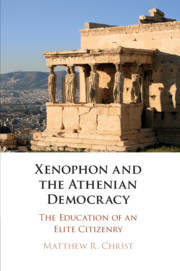Book contents
- Xenophon and the Athenian Democracy
- Xenophon and the Athenian Democracy
- Copyright page
- Dedication
- Contents
- Acknowledgments
- Introduction
- Chapter 1 Athens in Crisis in the Hellenica
- Chapter 2 Politics and the Gentleman in the Memorabilia
- Chapter 3 Work, Money, and the Gentleman in the Oeconomicus
- Chapter 4 The Education of Callias in the Symposium
- Chapter 5 Xenophon as Expert, Advisor, and Reformer in the Hipparchicus and Poroi
- Chapter 6 Xenophon the Democratic Orator
- Conclusions
- Bibliography
- Index of Ancient Citations
- General Index
Conclusions
Elite Readers, Elite Citizens
Published online by Cambridge University Press: 28 August 2020
- Xenophon and the Athenian Democracy
- Xenophon and the Athenian Democracy
- Copyright page
- Dedication
- Contents
- Acknowledgments
- Introduction
- Chapter 1 Athens in Crisis in the Hellenica
- Chapter 2 Politics and the Gentleman in the Memorabilia
- Chapter 3 Work, Money, and the Gentleman in the Oeconomicus
- Chapter 4 The Education of Callias in the Symposium
- Chapter 5 Xenophon as Expert, Advisor, and Reformer in the Hipparchicus and Poroi
- Chapter 6 Xenophon the Democratic Orator
- Conclusions
- Bibliography
- Index of Ancient Citations
- General Index
Summary
This study has argued that Xenophon seeks to educate his elite Athenian readers concerning their critical political role within democratic Athens and that he pursues this project in diverse ways in his writings. Xenophon’s profound interest in this topic may have its origins in the turmoil that he witnessed in Athens in the final decade of the fifth century and that he recounts in the opening books of the Hellenica. Xenophon’s presentation of the Arginusae affair (405) makes it clear that in his view the success of the Athenian democracy depends largely on the quality of its elite leaders, on whose advice and guidance the dēmos relies. Although Xenophon’s narrative of the events of 404/3 suggests that he is sympathetic with those who sought to replace democracy with a moderate oligarchy, his negative depiction of the reign of the Thirty, which turned out to be far from moderate, and his favorable portrayal of the restored democracy indicate that he does not regard constitutional change as realistic or even desirable for Athens. In light of this, the question of the political role of the city’s elite takes on a special urgency for Xenophon: If the democratic city cannot prosper without good elite leadership, how can the Athenian elite lead responsibly and effectively?
- Type
- Chapter
- Information
- Xenophon and the Athenian DemocracyThe Education of an Elite Citizenry, pp. 184 - 192Publisher: Cambridge University PressPrint publication year: 2020

